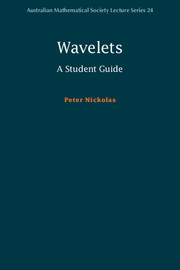Preface
Published online by Cambridge University Press: 23 February 2017
Summary
Overview
The overall aim of this book is to provide an introduction to the theory of wavelets for students with a mathematical background at senior undergraduate level. The text grew from a set of lecture notes that I developed while teaching a course on wavelets at that level over a number of years at the University of Wollongong.
Although the topic of wavelets is somewhat specialised and is certainly not a standard one in the typical undergraduate syllabus, it is nevertheless an attractive one for introduction to students at that level. This is for several reasons, including its topicality and the intrinsic interest of its fundamental ideas. Moreover, although a comprehensive study of the theory of wavelets makes the use of advanced mathematics unavoidable, it remains true that substantial parts of the theory can, with care, be made accessible at the undergraduate level.
The book assumes familiarity with finite-dimensional vector spaces and the elements of real analysis, but it does not assume exposure to analysis at an advanced level, to functional analysis, to the theory of Lebesgue integration and measure or to the theory of the Fourier integral transform. Knowledge of all these topics and more is assumed routinely in all full accounts of wavelet theory, which make heavy use of the Lebesgue and Fourier theories in particular.
The approach adopted here is therefore what is often referred to as ‘elementary’. Broadly, full proofs of results are given precisely to the extent that they can be constructed in a form that is consistent with the relatively modest assumptions made about background knowledge. A number of central results in the theory of wavelets are by their nature deep and are not amenable in any straightforward way to an elementary approach, and a consequence is that while most results in the earlier parts of the book are supplied with complete proofs, a few of those in the later parts are given only partial proofs or are proved only in special cases or are stated without proof.
Information
- Type
- Chapter
- Information
- WaveletsA Student Guide, pp. vii - xPublisher: Cambridge University PressPrint publication year: 2017
